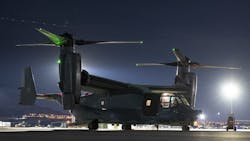Raytheon starts production on Silent Knight aircraft radar
MacDILL AIR FORCE BASE, Fla. - Aircraft radar experts at Raytheon Technologies Corp. will start full production of covert terrain-following radar to enable military aircraft to infiltrate enemy territory by hiding in mountain passes, valleys, and in bad weather under terms of a $235.6 million five-year order announced this week.
Officials of U.S. Special Operations Command at MacDill Air Force Base, Fla., are asking the Raytheon Intelligence & Space segment in McKinney, Texas, to build and deliver the Silent Knight radar system.
Silent Knight is an above-K-band multi-aircraft terrain-following and terrain-avoidance radar designed to enable Special Forces aircraft to infiltrate dangerous areas undetected and at night with reduced risks of crashing while flying at low altitudes.
The radar is designed for the Lockheed Martin MC-130J four-engine turboprop; Boeing MH-47G heavy-lift helicopter; Sikorsky MH-60M medium-lift helicopter; and the Bell Boeing CV-22 block 30 tiltrotor aircraft.
Special Operations commanders need aircraft capable of flying at low altitudes covertly at night to insert and remove commando forces for operations behind enemy lines.
The system also provides navigation support, ground mapping, and weather information to air crews. The radar has advanced terrain-following and -avoidance capabilities and will be lighter and require less power than its predecessors. Raytheon's principal partners on the Silent Knight radar include DRS Technologies in St. Louis, and Collins Aerospace in Cedar Rapids, Iowa.
The Silent Knight radar operates at low-power levels to reduce its chances of being detected by enemy passive RF receivers. The system also has color weather tactical data displays to enhance pilot situational awareness.
Essentially the Silent Knight radar system enables MC-130J and other Special Forces aircraft to fly close to the ground -- hugging low spots in mountain passes, valleys, and other terrain features -- even when darkness and bad weather cause zero-visibility.
The system's sophisticated weather radar also enables the aircraft to hide in clouds, fog, dust, rain storms, and total darkness at very low altitudes. Its radar can pick out key details like electrical towers and high-tension power lines while providing pilots with enough warning to avoid them.
On this contract Raytheon will do the work in McKinney, Texas, and Forest, Miss., and should be finished by July 2025. For more information contact Raytheon Intelligence & Space online at www.rtx.com, or U.S. Special Operations Command at www.socom.mil.
